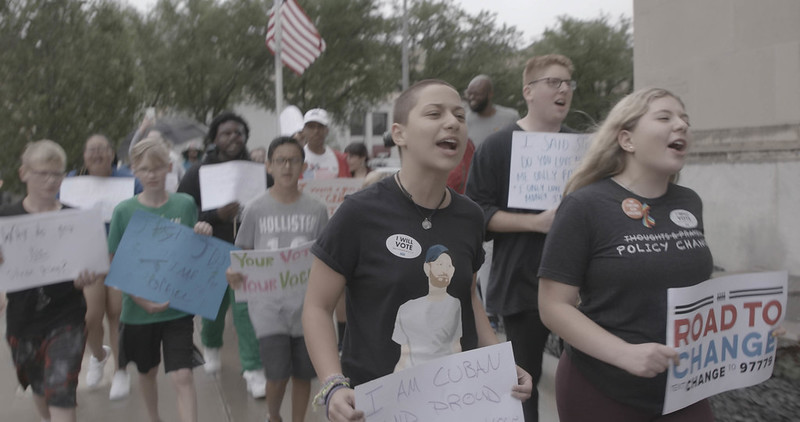
Sundance Film Review: Us Kids
Sundance
Us Kids
Sundance Film Festival
Director: Kim A. Snyder
The shooting at Marjory Stoneman Douglas High School in Parkland, Florida, is still fresh for many, particularly for the students who survived the ordeal. With the second anniversary of the tragic event looming, documentary Us Kids is the story of the survivors dealing with their trauma.
From the Parkland shooting, Emma Gonzalez and David Hogg became the face of the movement, calling for more sensible gun control in government. Gonzalez and Hogg received both positive and negative attention by representing their classmates, as well as other victims and survivors of gun violence. Hogg, in particular, deals with death threats from far-right groups and accusations of being a crisis actor. Us Kids shows how these teens navigate their PTSD as they deal with the extraordinary feat of being influential activists at the crux of an important, hot-button issue.
While the film shows a lot of Gonzalez, Hogg and other active members of the March for Our Lives movement, I found that the most poignant story was that of Sam Fuentes, who was injured during the incident. She admits having extreme anxiety during her speaking engagements, most of which stems from her fear of being shot again. She visibly suffers panic attacks and gets sick at two of these speaking engagements. She also admits to having PTSD flashbacks and survivor’s guilt from the incident. While she is mad at the fact that her innocence was taken by this horrific event and wishes she could go back to being a “normal-ass kid,” she perseveres to honor her friend, Nicholas Dworet’s, legacy.
For me, Fuentes’ inner dialogue and friendship that she strikes up with Dworet’s younger brother, Alex, is the most heartbreaking and raw part of the film. Despite being so traumatized, mentally and physically, Fuentes takes comfort in helping Alex cope with the loss of his brother and his own PTSD from being present during the shooting (Alex was grazed by a bullet). The insight into the normalcy of their friendship as they take a road trip together shows that they are just normal teens who were pushed into a terrible situation. Their friendship also reveals a sense of hope for both of them can begin to heal after the incident.
I found it interesting that while gun-toting, right-wing Americans (particularly the Utah Gun Exchange) were vilified in the film through their threatening behavior toward the movement, there were actually a few moments that redeem some of these people. In one scene, some counter-protesters end up engaging in conversation with Hogg and reaching a mutual understanding.
While Us Kids really put a lot of the story in the survivors’ hands, I found that the film jumps around in a way that was difficult to keep track of the timeline of events, especially with regard to the midterm elections. However, Us Kids gives the survivors a way tell their story that’s harrowing but also relatable. I personally appreciate how the film does not focus too much on the details of the shooting itself but, rather, on the activism and life that has gone on in the wake of tragedy. –Ali Shimkus
Showtimes:
Jan. 29 // 12:00 p.m // Sundance Mountain Resort Screening Room
Jan. 31 // 2:30 p.m // The MARC Theatre Park City
Feb. 1 // 12:30 p.m // The Ray Theatre Park City
Read more of SLUG’s comprehensive coverage of the 2020 Sundance Film Festival.